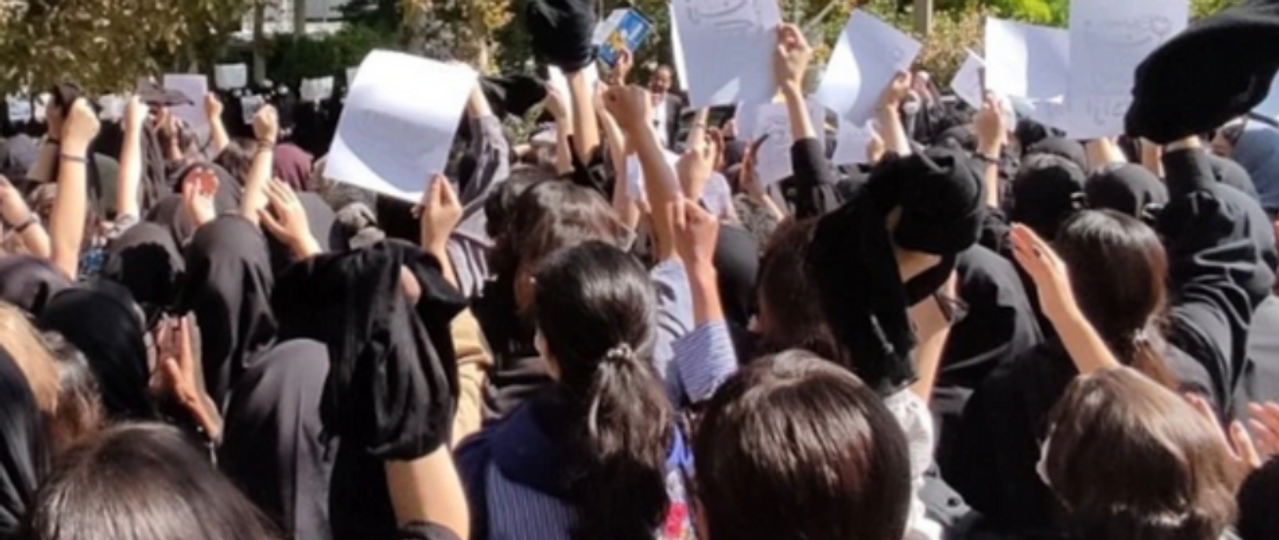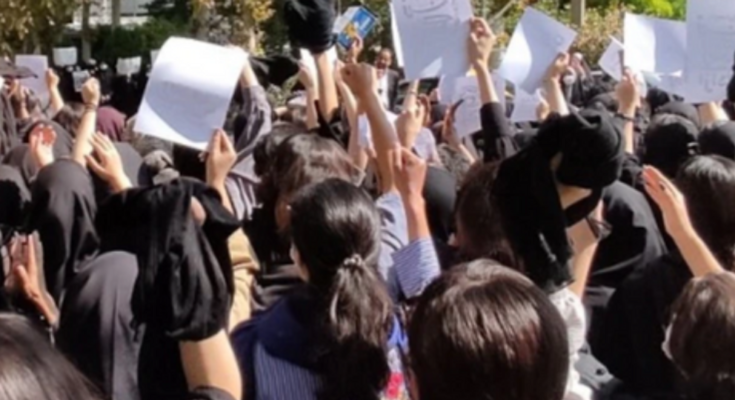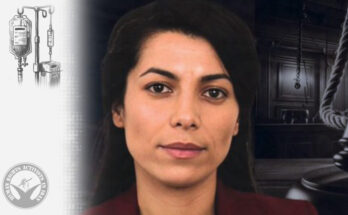By Maryam Sinaee
Source: Iran International

The ministry of higher education said institutions under its coverage will no longer offer educational and other services to students who do not abide by hijab rules.
“All universities and higher education institutions under the coverage of the Ministry of Sciences, Research and Technology will not be obliged to offer educational, welfare and other services to the few students who do not abide by the laws and regulations of the universities in this regard,” the ministry said in a statement Monday.
Speaking to the moderate conservative Khabar Online news website, Hassan Kia, attorney at law, said the statement is in violation of the Iranian constitution which gives every citizen the right to education and forbids government bodies from making their own laws.
Hijab defenders who rallied outside the governor’s office in Ramsar threatening to take the matter into their own hands.
ویدیوی منتشر شده در رسانههای اجتماعی نشان میدهد که گروهی از حامیان حکومت و حجاب اجباری در رامسر خطاب به محمود حسینی پور، استاندار مازندران، میگویند: «اگر در مورد حجاب کاری نکنید ما آتش به اختیار وارد میشویم.» pic.twitter.com/iLClVpuzdV
— ايران اينترنشنال (@IranIntl) April 2, 2023
“It is not clear who, and how, is going to decide whether the hijab rules have been broken or not in a university. Does letting a few locks of hair show from under a headscarf mean the rules have been broken, or is it totally flouting the hijab or putting it around one’s neck? Who is going to decide? This can cause a lot of strife in universities,” he said.
An ever-increasing number of women have been casting off their compulsory hijab for good since the beginning of the “Woman, Life, Freedom” movement six months ago but hardliners are now taking a much more aggressive approach to the issue of hijab to punish and bring these women under control.
“The issue of compulsory hijab is so intertwined with the existence of the suppressive Islamic Republic that [it considers] even taking one step back as total defeat,” Toronto-based women’s rights researcher Leili Pourzand told Iran International TV.
A female student wearing no hijab grilling the hardliner mayor of Tehran at Sharif University in December.
این دختر بدون هیچگونه حجابی
پشت تریبون دانشگاه شریف
جلوی زاکانی سخنرانی کرده
و ده ها ادعای بی سند و مدرک را بیان داشته است.
این فرد هیچ حقی برای سخن گفتن
در پشت تریبون رسمی دانشگاه دولتی این کشور را
در حالی که ساده ترین قوانین آن را رعایت نمی کند ندارد
این مماشات و روشنفکری نیست! pic.twitter.com/XfzYaS6Vu6— amirhossein_hosseini.ir (@hosseini_eco) December 8, 2022
Most officials and hardliners insist that flouting hijab is a crime that must be dealt with, and the Ministry of Interior said in a statement last week that the Islamic Republic would enforce the hijab as an “unquestionable requirement of the Sharia.” When asked about the issue a few days ago, President Ebrahim Raisi also stressed that women must abide by the hijab rules because it is “law”.
The ultra-hardliner politicians and clerics who have been demanding stricter enforcement of the hijab have also called on their supporters to actively carry out their Islamic duty of “calling to virtue and forbidding wrong”. This, however, is causing many angry encounters in between the vigilantes and women who refuse to be bullied into wearing the hijab.

Even some regime insiders who do not question the necessity of hijab as a principle are critical of the aggressiveness of vigilantes and the energy and time that the government is spending to enforce the hijab instead of addressing more vital matters such improvement of the economy, corruption, and poverty.
“I seriously believe that we are distancing ourselves from the real teachings of Islam … when authorities show more sensitivity to girls’ hair than to bribery, embezzlement, garbage scavenging, injustice and the usury that has overtaken our banks,” Moeinoddin Saeedi, representative of Chabahar in the parliament, said Monday.
Some ultra-hardliners in the parliament have taken steps to enact new hijab legislation to punish those who refuse to abide by the rules by imposing cash fines of up to $60,000 and other penalties including revocation of drivers’ licenses and passports, or a ban on the use of the internet for celebrities and social media influencers and bloggers.
Parliament Speaker Mohammad-Bagher Ghalibaf, according to one of the lawmakers behind the plan, Morteza Agha-Tehrani, has promised to help urgently pass the new hijab legislation.




